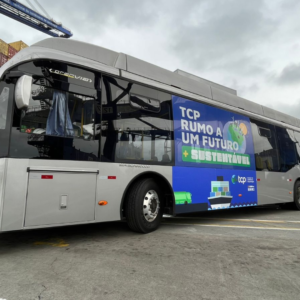Students from the 22nd Special Course for Port Security Supervisors learned about the practices adopted by the terminal.
On Wednesday (30), 56 participants from the 22nd Special Course for Port Security Supervisors visited the company that manages the Paranaguá Container Terminal (TCP). The training was promoted by the National Commission for Public Safety in Ports, Terminals and Waterways (Conportos) and TCP hosted one of the stages of the training, which takes place in Paranaguá, at Portos Paraná. The course began on Monday (28) and continues until Friday (1).
According to Kayo Zaiats, manager of health, safety at work, the environment and assets, the training aims to train new Port Security Supervisors to protect against risks and threats that could harm the port area, making it ever safer.
“For us, it’s an honor to be selected to receive the students, because we know the importance of the security demands in a port terminal. For the students, it is essential to learn about the application of the International Ship and Port Facility Security Code (ISPS Code), which is implemented here at the terminal. The ISPS Code guarantees our broad vision of security throughout the port area,” explains Zaiats.
The president of Conportos, Marcelo João da Silva, also considers the visit to the terminal an essential stage for the course. “Having contact with a facility that experiences the challenge of port security on a daily basis is very important so that they can later replicate all the theory they learned in the classroom in their home states,” he said.
During the visit, the students, instructors and technicians from different parts of the country visited TCP’s emergency command center, where the screens of the monitoring cameras and the terminal’s entire surveillance system are displayed.
The visitors then toured the operational areas where they learned more about the security practices adopted. TCP currently has around 400 24-hour monitoring cameras, scanners for checking cargo, 13 24-hour armed surveillance posts and an alarm system in case of invasion.

Army training
This is the second visit in 2023 focusing on the security systems applied on TCP’s premises. In May, 112 students from the Brazilian Army’s Officer Training School, based in Rio de Janeiro, learned about security standards and how the inspection flow works at the terminal.
The Army is responsible for controlling and authorizing various products in Brazil, such as explosives and their derivatives, chemical warfare agents and products of military interest. To guarantee the safety of the materials, TCP has a special area for IMO cargo (considered dangerous), which covers 7,056 m² of the terminal. TCP also has large forklift trucks with a CO2 fire suppression system, which smothers flames and prevents fires from spreading.



